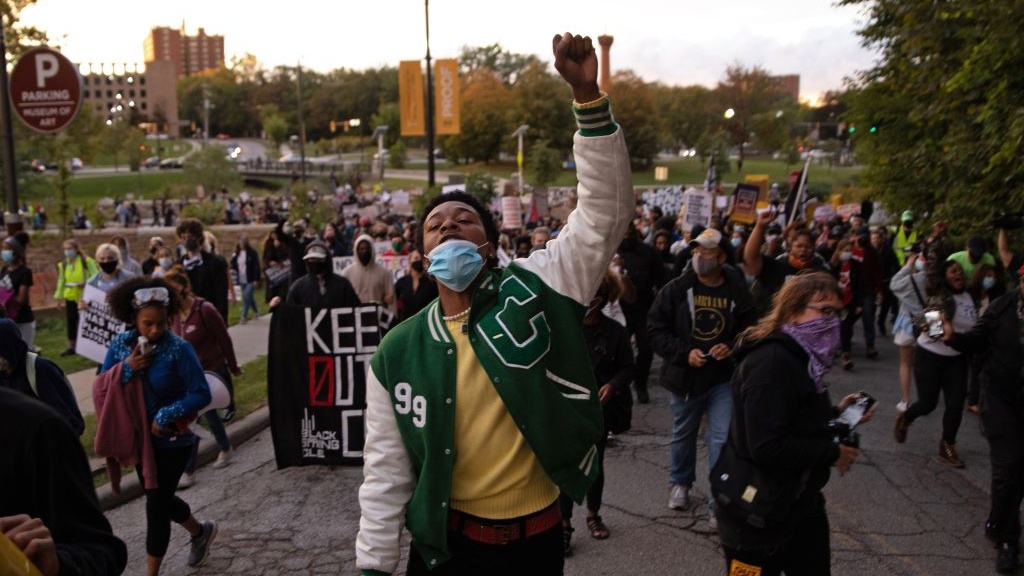Vote this election season. Mail in your ballot if you don't want to go in person (Blavity has provided resources for doing that successfully). Otherwise, vote in person (and let us help you prepare for any issues that may come up with in-person voting this year).
But in addition to voting, there are a number of other ways to engage in politics this year.
2020 has been rough, but we can make the future better if we all play our part. Here are five ways to get involved in politics beyond voting:
1. Donate
If you want to support your favorite candidate, write a check or submit an online donation. It doesn't matter if you don't have Bill Gates or Michael Bloomberg money. Even a little bit helps. For Barack Obama's 2012 campaign, the average amount his donors contributed was $56.
In addition to the big races, there are a number of congressional and state or local races going on this year. The total amount spent in these campaigns is usually much smaller than the big name political races, meaning that your dollars can make a big impact. NerdWallet has put together a short guide with tips on how to donate effectively.
In addition to supporting candidates and parties, you can also donate to organizations that are doing important work. As Blavity previously reported, organizations like LeBron James' More Than a Vote and JAY-Z and Meek Mill's Reform Alliance are fighting for rights and justice in our community. There are many organizations out there doing good work, and they could use your support. And if you want to support protestors (more on that below) or other people who are locked up, one way to do so is to donate to organizations like the Black-led National Bail Fund.
More Black organizations that can use our financial support can be found here.
2. Volunteer
Contributing your time can be just as valuable as giving your dollars.
Elections, activism and social campaigns all need dedicated people who are willing to put in the work to help make change in their communities and in the nation. This election will be decided on how many people get out (or mail in) and vote, and the get out the vote effort needs people.
More Than A Vote, for example, has recruited tens of thousands of volunteers to work this election, but more people are needed for organizations like this and for campaigns seeking to get as many votes as possible. Especially given the challenges that COVID-19 has created, there is more of a need than ever for people who can safely participate and support one another in our communities.
Looking for the right organization to give your time to supporting? This list is a good place to start.
3. Protest
Politics is about both gaining political power and fighting the powers that be. Public protest is an important and powerful method for highlighting problems and pushing solutions to racial injustice, police violence, economic inequality and many other issues.
From the American Revolution to the Civil Rights Movement, protest has been a crucial part of American history since the very beginning of the country. The Black Lives Matter movement has been fighting for justice for years now, and responding to the killings of George Floyd, Breonna Taylor and others this year, BLM has leveled up and changed the country. Despite the lies and fear-mongering tactics of those trying to preserve the existing system, BLM and other movements are a key part of holding all our leaders accountable and making sure that justice and equality are finally achieved in this nation.
Regardless of who wins in November, this country will be a long way from reaching these goals, and no political party or set of government officials will make all the necessary changes without public pressure to do so. While making sure to be safe (including wearing your face mask and maintaining social distance), hitting the streets reminds the powers that be that we won't tolerate our lives being discarded nor our voices being ignored.
Amnesty International has put together a fact sheet with tips for safely protesting and how to assert your rights to public demonstration.
4. Post, tweet or Snapchat
You can make a difference without putting down your laptop.
While social media was once dismissed as trivial, hashtag activism has shown its power to change the world. Black folk have been at the forefront of utilizing the 'net to create change. With a Facebook post and a hashtag, Patrisse Cullors, Alicia Garza and Omal Tometi helped call attention to the failure of justice for Trayvon Martin into the BLM movement. Tarana Burke created #MeToo to create a safe space for survivors of sexual assault and harassment, and the tag became a rallying cry to fight these injustices around the world.
Ordinary people around the country use Twitter, YouTube, Facebook and other sites to document crimes and injustice, spread information, raise awareness and hold our leaders and fellow citizens accountable for their words and actions. If you see something, record it and upload it. If you have something to say, post it.
5. Run for office
If you wish there were more candidates who stood for the things that you stand for, you're likely not alone.
If you're passionate and dedicated to making things better, consider running for office yourself. Officials such as Representative Alexandria Ocasio-Cortez have demonstrated that new people and new ideas can break into our political system. Money is also becoming less of a barrier for political newcomers. For example, Senate candidate Marquita Bradshaw won Tennessee's Democratic primary with only $24,000 in fundraising.
The old proverb "be the change you want to see in the world" is a good rule for American politics.
Change is possible in this country and in your local community. It won't all happen on November 3, and there are many ways to be a force for good, before, during and after Election Day.
